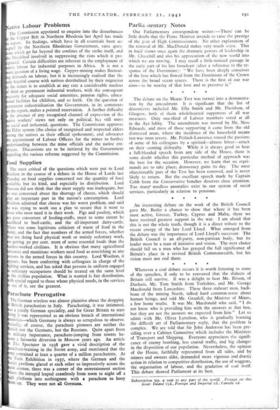Whenever a coal debate occurs it is worth listening to
some of the speeches, if only to be reassured that the dialects of Britain still survive. It was a delight to hear Mr. Ritson, of Durham, Mr. Tom Smith from Yorkshire, and Mr. George Macdonald from Lancashire. These three stalwart men, back- bone of the mining North, talked hard common-sense about human beings, and told Mr. Grenfell, the Minister of Mines, a few home truths. It was Mr. Macdonald who said, " I do not know who is providing him with the answers at that box, but they are not the answers we expected from him." Let us admit with Mr. Oliver Lyttelton, who is gradually learning the difficult art of Parliamentary reply, that the problem is complex. We are told that Sir John Anderson has been pre- siding over a Cabinet Committee which includes the Ministers of Transport and Shipping. Everyone appreciates the signifi- cance of enemy bombing, less coastal traffic, and big changes in the disposition of our population. Nevertheless, the opinion of the House, faithfully represented from all sides, and by miners and owners alike, demanded more vigorous and drastic action in relation to competitive distribution, the use of waggons, the organisation of labour, and the gradation of coal itself. This debate showed Parliament at its best.






























 Previous page
Previous page